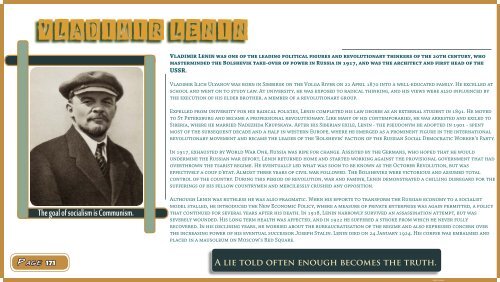You also want an ePaper? Increase the reach of your titles
YUMPU automatically turns print PDFs into web optimized ePapers that Google loves.
Vladimir Lenin<br />
Vladimir Lenin was one of the leading political figures and revolutionary thinkers of the 20th century, who<br />
masterminded the Bolshevik take-over of power in Russia in 1917, and was the architect and first head of the<br />
USSR.<br />
Vladimir Ilich Ulyanov was born in Simbirsk on the Volga River on 22 April 1870 into a well-educated family. He excelled at<br />
school and went on to study law. At university, he was exposed to radical thinking, and his views were also influenced by<br />
the execution of his elder brother, a member of a revolutionary group.<br />
Expelled from university for his radical policies, Lenin completed his law degree as an external student in 1891. He moved<br />
to St Petersburg and became a professional revolutionary. Like many of his contemporaries, he was arrested and exiled to<br />
Siberia, where he married Nadezhda Krupskaya. After his Siberian exile, Lenin - the pseudonym he adopted in 1901 - spent<br />
most of the subsequent decade and a half in western Europe, where he emerged as a prominent figure in the international<br />
revolutionary movement and became the leader of the 'Bolshevik' faction of the Russian Social Democratic Worker's Party.<br />
In 1917, exhausted by World War One, Russia was ripe for change. Assisted by the Germans, who hoped that he would<br />
undermine the Russian war effort, Lenin returned home and started working against the provisional government that had<br />
overthrown the tsarist regime. He eventually led what was soon to be known as the October Revolution, but was<br />
effectively a coup d'etat. Almost three years of civil war followed. The Bolsheviks were victorious and assumed total<br />
control of the country. During this period of revolution, war and famine, Lenin demonstrated a chilling disregard for the<br />
sufferings of his fellow countrymen and mercilessly crushed any opposition.<br />
The goal of socialism is Communism.<br />
Although Lenin was ruthless he was also pragmatic. When his efforts to transform the Russian economy to a socialist<br />
model stalled, he introduced the New Economic Policy, where a measure of private enterprise was again permitted, a policy<br />
that continued for several years after his death. In 1918, Lenin narrowly survived an assassination attempt, but was<br />
severely wounded. His long term health was affected, and in 1922 he suffered a stroke from which he never fully<br />
recovered. In his declining years, he worried about the bureaucratisation of the regime and also expressed concern over<br />
the increasing power of his eventual successor Joseph Stalin. Lenin died on 24 January 1924. His corpse was embalmed and<br />
placed in a mausoleum on Moscow's Red Square.<br />
Page 171<br />
A lie told often enough becomes the truth.<br />
Abhi Sharma


